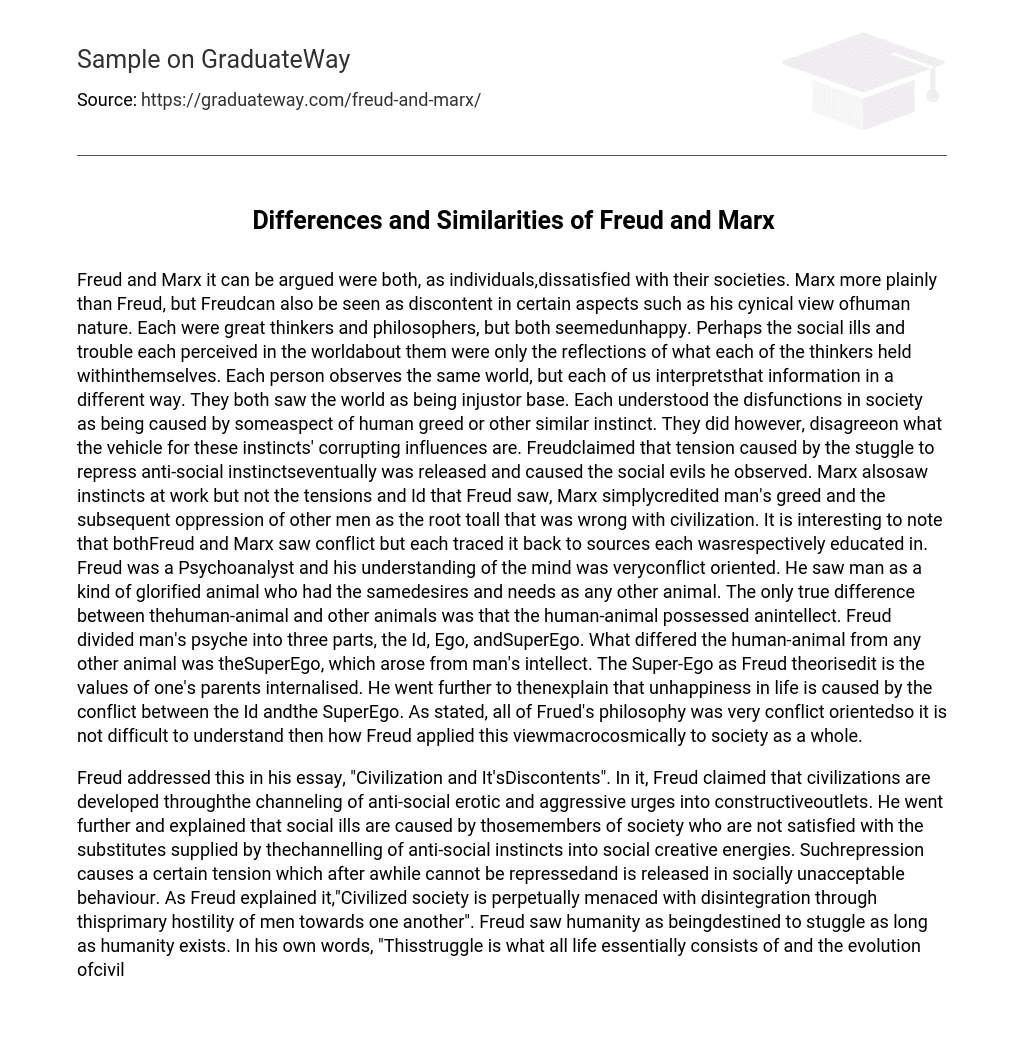Freud and Marx it can be argued were both, as individuals,dissatisfied with their societies. Marx more plainly than Freud, but Freudcan also be seen as discontent in certain aspects such as his cynical view ofhuman nature. Each were great thinkers and philosophers, but both seemedunhappy.
Perhaps the social ills and trouble each perceived in the worldabout them were only the reflections of what each of the thinkers held withinthemselves. Each person observes the same world, but each of us interpretsthat information in a different way.
They both saw the world as being injustor base. Each understood the disfunctions in society as being caused by someaspect of human greed or other similar instinct. They did however, disagreeon what the vehicle for these instincts’ corrupting influences are. Freudclaimed that tension caused by the stuggle to repress anti-social instinctseventually was released and caused the social evils he observed. Marx alsosaw instincts at work but not the tensions and Id that Freud saw, Marx simplycredited man’s greed and the subsequent oppression of other men as the root toall that was wrong with civilization. It is interesting to note that bothFreud and Marx saw conflict but each traced it back to sources each wasrespectively educated in.
Freud was a Psychoanalyst and his understanding of the mind was veryconflict oriented. He saw man as a kind of glorified animal who had the samedesires and needs as any other animal. The only true difference between thehuman-animal and other animals was that the human-animal possessed anintellect. Freud divided man’s psyche into three parts, the Id, Ego, andSuperEgo. What differed the human-animal from any other animal was theSuperEgo, which arose from man’s intellect. The Super-Ego as Freud theorisedit is the values of one’s parents internalised. He went further to thenexplain that unhappiness in life is caused by the conflict between the Id andthe SuperEgo. As stated, all of Frued’s philosophy was very conflict orientedso it is not difficult to understand then how Freud applied this viewmacrocosmically to society as a whole.
Freud addressed this in his essay, “Civilization and It’sDiscontents”. In it, Freud claimed that civilizations are developed throughthe channeling of anti-social erotic and aggressive urges into constructiveoutlets. He went further and explained that social ills are caused by thosemembers of society who are not satisfied with the substitutes supplied by thechannelling of anti-social instincts into social creative energies. Suchrepression causes a certain tension which after awhile cannot be repressedand is released in socially unacceptable behaviour. As Freud explained it,”Civilized society is perpetually menaced with disintegration through thisprimary hostility of men towards one another”. Freud saw humanity as beingdestined to stuggle as long as humanity exists. In his own words, “Thisstruggle is what all life essentially consists of and the evolution ofcivilizations may therefore be simply describes as the struggle for the lifeof the human species”.
Although like Freud, he saw conflict within society, Karl Marx hadradically different ideas and perceptions about humanity and civilization.
Marx saw the same things as Freud, but chalked it up to inter-economicclass conflict instead of conflict within one’s psyche. This class conflictwas caused by one class, the Bourgeois, which he characterized as having thegreat majority of wealth and power and having rule over the lower class, orProletariots, which worked for the Bourgeois. This view of economic classstrife was just one stage of Marx’s idea that all of history was leading upto some finality and that at such a time all of man would be able to live ina Utopia. Marx also applied this idea in reverse and attempted to explain thatthe Proletariot class and Bourgeois class have existed in varying forms forall of mankind’s history. He tried to illustrate using the example of slaveryand feudalism that each time a form of oppression by a class of another classwas destroyed a new form took it’s place. Marx felt that it was a Communist’sresponsibility to awaken the mostly ignorant Proletariot to this and help toabolish the concept of private property, which he also believed was theprimary means of the Bourgeois to oppress the Proletariot workers.
Marxpredicted that Capitalism and it’s Bourgeois patrons would eventually becomethin out due to competition and therefore the wealth would becomeincreasingly more centralised in fewer people’s pockets. The spread of wealthwould eventually become so uneven and lop-sided that a revolution would occurand the Bourgeois would be overthrown. Marx believed that Capitalism wasprobably the last form of oppression and once overthrown, everyone would liveas a single society where all men could live in peace without rule over oneanother, Utopia.
Freud and Marx although similar in some ways, held very differentviews about the world around them. Aside from the obvious difference thatFreud believed the cause of social evils was within man himself and Marx sawthe problem as being an economic one as long as history itself, there areother more specific differences. Freud saw the conflict as being internaland therefore expressed within the society in which a man is part of, butMarx saw the conflict in a more black-and-white sense. To Marx, it wasbetween two groups of people, the oppressed and the oppressors. Marx howeverwas also generally more optimistic, especially when it came to predictionsof the future. He saw the underdogs, the Proletariots eventually overcomingadversity and establishing Utopia. Freud is much less exciting for all hecould divine was that humanity would continue to struggle. Freud seemedperhaps to believe that the meaning of life was struggling. Freud saw nothingof the occasional revolutions Marx did, it was all one long struggle to him.
Freud and Marx theorised about and observed the world around them andinterpreted it in the terms and ways they were most accomplished at andfamiliar with. The question remains unanswered though, did Freud and Marxsimply observe the true reality of the world and state what they saw, or wasthe world about them in actually reflecting themselves.
Psychology





